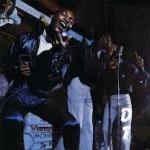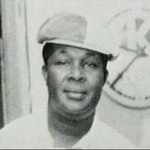
By Patricia Meschino—-
When veteran Jamaican singer Leroy Sibbles took the stage at the St. Kitts Music Festival, the audience drew closer to savor his smooth delivery of vintage hits including “Fattie Fattie,” “Party Time” and “Why Did You Leave?” Sibbles, former lead vocalist of the legendary The Heptones (formed in the 60’s with the late Barry Llewellyn and Earl Morgan) was featured on the festival’s Friday Reggae Night, but the classics he performed don’t quite fit that categorization.
The Heptones were among the foremost harmony trios during a significant, if short-lived, period (roughly 1966-1968) known in Jamaican music as rocksteady (or rock steady), the direct forerunner to reggae. “The Heptones had so many hits during the rocksteady era and here I am 50 years later singing them for an audience of different ages and even the young ones know all the words,” Sibbles told Billboard backstage at the St. Kitts Music Festival. The Heptones recorded many of their biggest singles for producer Coxsone Dodd’s Studio One label, often referred to as Jamaica’s Motown because so many young talents were groomed there, just like its Detroit counterpart.

At Studio One, Sibbles worked as an arranger, talent scout, backing vocalist and resident bassist, his contributions heard on countless hits issued by the label. “Rocksteady was a special time, the music slowed down from ska’s uptempo, which paved the way for reggae. The Heptones sang mostly love songs then but we also did songs like “Equal Rights,” “Fight It to The Top” and “Soul Power” that reflected the plight of the poor man, because that’s who we were. Deejays (Jamaican rappers) like U Roy started recording for the first time then, rhyming over rocksteady singers’ records, so many of the Jamaican music styles that we have today come from that time.”

Since 1994, July 1 has been observed as International Reggae Day (IRD), hosted in Kingston, Jamaica, and celebrated this year in 35 cities throughout the world. In honor of rocksteady’s 50th anniversary, IRD 2016 has joined forces with reggae independent VP Records to highlight several of the genre’s most influential hits for the July 1 release of First Class Rock Steady, a 40-track compilation on the label’s 17 North Parade imprint. “Rocksteady’s effect upon Jamaican music is immeasurable and its catalog continues to influence generations of reggae artists and musicians around the world,” comments Andrea Davis, founder/producer of IRD, a 24-hour global media event, which will expand to International Reggae Week (July 1-7) in 2017. Rocksteady’s impact was felt internationally in 1968 with American singer Johnny Nash’s “Hold Me Tight,” recorded in Kingston, and Desmond Dekker’s “Israelites” in 1969. The Paragons’ “The Tide Is High” topped the Hot 100 in 1980 via Blondie’s cover while a 2001 version by U.K. female group Atomic Kitten has reportedly sold more than 1.5 million copies worldwide.

In 2004 Sean Paul (featuring Sasha) reached No. 14 on the Hot 100 reinterpreting rocksteady’s godfather the late Alton Ellis’ hit “I’m Still In Love With You.” Ellis’ 1966 single “Rock Steady,” produced by Dodd, is said to be the very first to reference rocksteady in its lyrics. The late Hopeton Lewis’ “Take It Easy,” produced by Ken Khouri and cited in First Class Rock Steady’s liner notes as the first rocksteady song, is prominently featured in a current TV ad for Corona beer.
“The golden era of Jamaican music was truly the rocksteady period, many of our greatest vocalists emerged during this time, including the late John Holt as well as rock steady queen Phyllis Dillon and Freddie McGregor, Marcia Griffiths, Ken Boothe, who are still going strong,” Davis continued. “Producers including Duke Reid, Coxsone Dodd, Bunny Lee and our first female producer, Sonia Pottinger, were essential players in the genre, working with musicians to create timeless rhythms that are still used to make hit records.”

By 1966, Jamaican music had shifted away from the quick-paced, brass driven tempo of its homegrown ska, developed in the late 1950’s as a distinctively Jamaican amalgamation of R&B, calypso and the island’s mento (folk music). Rocksteady’s relaxed, sparser beats allowed vocalists and instrumentalists to fully display their talents. The late Trinidad born and raised guitarist Nerlyn “Lynn” Taitt, who lived in Jamaica for several years, was pivotal in reducing the music’s speed, reportedly seeking to replicate the rhythms of his island’s indigenous steel bands into his guitar playing. Other key musicians of the period include keyboardist Jackie Mittoo, saxophonist Tommy McCook, bassist Jackie Jackson and drummer Winston Grennan.

Numerous original songs including The Wailers’ “Let Him Go,” and Desmond Dekker and the Aces’ “Shanty Town 007” addressed Jamaica’s burgeoning street gang culture, referred to as rude boys, and several American soul hits by The Drifters, Chuck Jackson and Marvin Gaye were gracefully interpreted by Jamaican artists throughout this period. However, it was the intricately meshed harmonies of The Impressions (Curtis Mayfield, Fred Cash, Sam Gooden) led by Mayfield’s beautiful falsetto that had the greatest influence on rocksteady’s direction, spawning a proliferation of harmony trios that included The Cables, The Gaylads, The Melodians, The Paragons and The Silvertones. “While ska carried a lot of Biblically derived commentaries like “Six and Seven Book of Moses” (The Maytals) and “Carry Go Bring Come” (Justin Hinds and the Dominoes) rocksteady was dominated by romantic lyrics sung by harmony groups, the slower, heavier basslines made it a sexier music,” offers Jamaican music industry veteran Tommy Cowan, formerly of The Jamaicans who had several rocksteady hits including “Ba Ba Boom,” produced by Duke Reid, and included on the First Class Rock Steady compilation.

Although the period officially ended in 1968, rocksteady records were still made even as reggae came to prominence with rhythms anchored by a more a forceful drum and bass. “Sometimes what we call reggae today is actually rocksteady,” says contemporary Jamaican singer/songwriter Tarrus Riley, whose father, the late Jimmy Riley, was a member of The Uniques and The Sensations prior to embarking on a successful solo career. Tarrus’s 2014 album Love Situation (Juke Boxx/Cannon/Zojak Worldwide LLC), which debuted at No. 1 on the Reggae Album chart in Feb. 2014, offers an exquisitely crafted tribute to rocksteady, adapting 21st century sensibilities to nearly 50-year-old rhythms culled from the vaults of seminal labels such as Reid’s Treasure lsle. “I grew up around this music so I want my generation to hear the beauty of the slower, sweet love songs. We have lost so many of these artists,” Riley paused, “so I wanted to honor the work that they did.”


You must log in to post a comment.